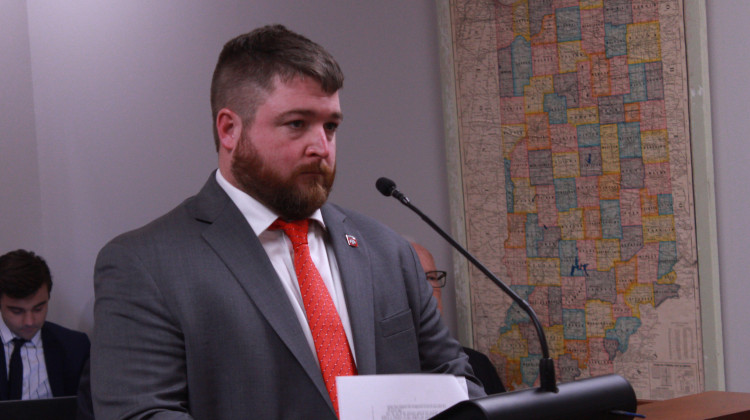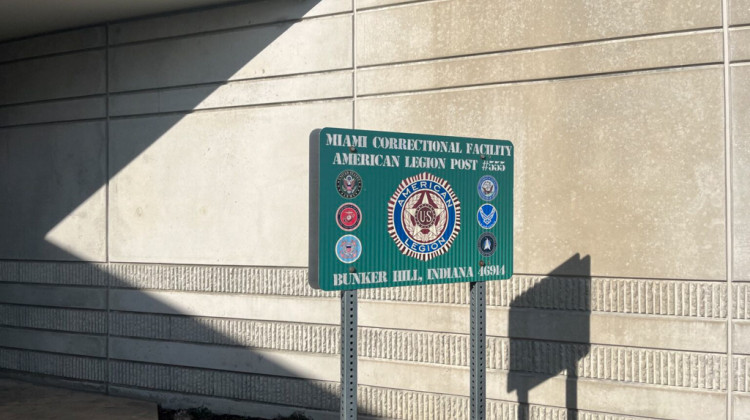
The new version of the bill explicitly makes the state immune to legal action for reports made to the registry "in good faith."
Brandon Smith/IPB NewsDirect support professionals (DSPs) provide in-home care for people with developmental and intellectual disabilities. DSPs can be parents or loved ones of the client.
In some cases, DSPs abuse and neglect those they’re supposed to care for. Data show people with disabilities are generally more likely to face abuse and violence than those without.
Loren Pilcher employs DSPs as chief operating officer of Sweet Behavior, LLC, a disability services provider in southern Indiana. He also regularly works as a direct support professional for his company “because of the staffing shortage.”
He and other advocates say abusive DSPs often get away with it by going to work for another provider.
The state has an incident reporting system for DSP abuse, but it’s not accessible to the public or providers – so no one can easily check whether the person they’re about to hire or let into their home has been accused by a former client of stealing medication, using physical violence or being drunk and high while providing care.
“Currently I know of three people who I personally fired and reported to the police and the Bureau of Developmental Disabilities for substantiated abuse – including breaking a person's ankle – and they are still working with another company,” Pilcher said. “The DSP shortage crisis is so pervasive that certain companies don't even care.”
For years, legislative attempts to create a registry to track substantiated cases of abuse and neglect by DSPs have fallen short. 2023’s attempt, House Bill 1342, passed the legislature in the final hours of the session following a tumultuous journey.
“When I call to do professional reference checks, most companies won't actually tell me why someone's been let go,” Pilcher said. “So that's highly problematic and the registry would certainly help with that.”
HB 1342 originally passed the House unanimously in February. When it got to the Senate, it was almost amended to use a cheaper alternative to creating a full new registry which advocates said “wouldn’t be enough.” Instead of making that change, a Senate committee voted to strip the registry language out entirely.
The language was apparently taken out because providers who employ DSPs feared they could be held liable for causing a DSP to lose a job opportunity by reporting them for alleged abuse to the registry. All that remained in the Senate version was a requirement for DSPs to receive standardized training created by the state that could lead to a certification.
The bill’s author, Rep. Julie Olthoff (R-Crown Point), said she wasn't done fighting for the registry. It is now part of the final version of the bill that both chambers voted to send to the governor’s desk Thursday. He gets seven days to either sign it, veto it or let it become law without his signature.
Kathryn Stafford-Cunningham, president and CEO of the Indiana Association of Rehabilitation Facilities, said changes made in the final version of the bill eased providers' fears significantly.
“We all want to keep bad actors out of the industry. The last thing anybody wants is a person to be harmed in any way,” Stafford-Cunningham said. “So our members take it very seriously when it comes to concerns about health, safety, exploitation or neglect. So they do very extensive background checks and vetting when it comes to finding direct support professionals because they are going into people's homes.”
The new version of the bill explicitly makes the state immune to legal action for reports made to the registry “in good faith.” It would be up to the department to define “substantiated abuse, neglect, and exploitation” and create levels within that to determine what the minimum requirements are for an incident to be reported to the registry. DSPs would be able to appeal any allegations against them to potentially have them removed from the registry.
When asked why she thinks it was so hard to get a registry bill passed, Stafford-Cunningham said it was easy to support the idea philosophically – but was more complex on a technical level.
“We also have to consider recruiting and retaining direct support professionals is incredibly difficult, especially in the workforce where you can go and work in a fast food industry for $18 an hour,” she said. “Do providers have enough staff to input the information in a timely fashion if it's on the providers to input the information about direct support professionals? Is it a deterrent to direct support professionals? Do DSPs feel like, ‘Well, I don't want to go on a registry, I don't want to be tracked.'”
Stafford-Cunningham said she didn’t think DSPs abusing people and getting away with it by bouncing from one provider to the next is “a widespread issue, but if there's one bad actor that's too many.”
Join the conversation and sign up for the Indiana Two-Way. Text "Indiana" to 73224. Your comments and questions in response to our weekly text help us find the answers you need on statewide issues throughout the legislative session. And follow along with our bill tracker.
There is limited data on how many abuse cases are perpetrated by DSPs and other care providers. Only 31 states report data on relationships between the abused and perpetrator to the National Adult Maltreatment Reporting System. In 2020, nearly a quarter of those states’ more than 44,000 perpetrators had no familial relationship to the victim.
A 2008 study surveyed a sample of 342 men with disabilities in the northwest United States. Of those men, 22 percent reported being abused by a care provider.
The study found “men with cognitive disabilities were … nearly three times more likely to report being held against their will or restrained and two and a half times more likely to report being hit, kicked, slapped or otherwise hurt.” Those with a paid or non-family care provider also reported abuse and neglect at higher rates.
“A systemic problem”
While Loren Pilcher of Sweet Behavior said he thinks a registry would be valuable, he also feels it wouldn’t be enough.
“It is a systemic problem that really comes down to not having a strong adult protective service framework and prosecutors not going after people who [commit abuse],” he said. “I don't think it will necessarily hurt anything. I hope it will help things. But to put it bluntly, if Adult Protective Services was set up differently and prosecutors actually prosecuted for abuse, I don't think the registry would be needed.”
Indiana law already requires providers to background check candidates and not hire anyone with a criminal background as a DSP, he said. The problem, he argues, is providers don’t always report cases to law enforcement and, when they do, the case rarely goes to court. Emily Munson, a lawyer and policy director for the state-run Indiana Disability Rights (IDR), agrees.
“Unfortunately, prosecutorial discretion, from what we've seen at IDR, often leads to dropping cases where the victim is a person with a disability,” Munson said. “We see prosecutors not moving forward because there are concerns about how the victim will be able to tell their story on the stand, what kind of witness they will make or, unfortunately, sometimes because prosecutors don't necessarily think what happened was that bad.”
As an example, Munson points to a 2021 report IDR compiled on a case of a man, dubbed “Aaron” in the report, who had “cerebral palsy, chronic kidney disease, blindness, bipolar disorder, and mitral valve disorder.” Aaron died in 2019 while under the care of his brother, dubbed “Harvey,” who was employed as his caregiver.
IDR’s report found that the provider that employed Harvey, Help at Home, failed to properly vet him. They allegedly ignored a failed competency test and missed an arrest in another state for hitting Aaron “in the head and face.” The 41-page report contains graphic images of “Aaron’s emaciated, 71-pound body with pressure wounds on his shoulder and hip” after he died.
Apart from the extensive neglect of Aaron by Harvey and Health at Home that the report documents, it also points out the Wayne County prosecutor initially charged Harvey with felony neglect in the death of his brother, only to drop the charges. The prosecutor declined to explain to IDR why the charges were dropped.
For Munson and Pilcher, who are both disabled themselves, a top priority is making sure disabled people are heard and empowered to take care into their own hands. They are weary of whether this bill will actually create that environment.
“It's my understanding that the registry will only be open to providers and state agency officials,” Munson said. “I think, on the one hand, it decreases the risk of liability and that people don't have to worry about their name being publicly smeared, if you will. But then, at the other end of the spectrum, it's not as empowering to the individuals receiving care as it could be.”
CLARIFICATION: A previous version of this story included two transcription errors in direct quotes. For the purpose of clarity, those have been changed.
Adam is our labor and employment reporter. Contact him at arayes@wvpe.org or follow him on Twitter at @arayesIPB.
 DONATE
DONATE






 Support WFYI. We can't do it without you.
Support WFYI. We can't do it without you.